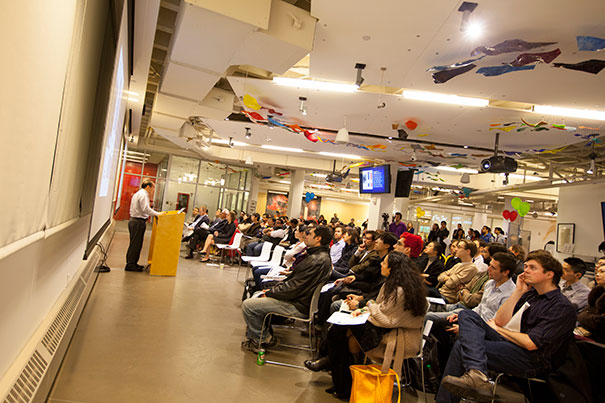
The Deans’ Design Challenge: Urban Life 2030, hosted by the i-lab, is the newest challenge, joining the President’s Challenge and the Deans’ Challenges for Cultural Entrepreneurship and Health & Life Sciences. The challenges offer students from across the University additional avenues to tackle pressing issues in specific disciplines.
File photo by Rose Lincoln/Harvard Staff Photographer
A challenge from the deans
Competition seeks ideas that would improve urban life by 2030
Harvard’s deans and the University’s provost have announced a new competition, challenging students to propose sustainable ideas that would improve urban life by 2030.
The Deans’ Design Challenge: Urban Life 2030, hosted by the Harvard Innovation Lab (i-lab) and chaired by Harvard Graduate School of Design Dean Mohsen Mostafavi and Harvard School of Engineering and Applied Sciences Dean Cherry Murray, calls on students to work collaboratively across disciplines.
“Urban populations are expected to grow by more than 50 percent in the next two decades, creating significant challenges to existing urban systems, infrastructure, and quality of life,” said Mostafavi. “Harvard is the ideal place to develop creative solutions to these problems, solutions that can only come from imaginative and entrepreneurial thinking. Today, we are challenging all Harvard’s students to bring their considerable energy to bear on these problems and together to imagine the future.”
The challenge includes four topic areas: responsive cities, urban metabolisms, aging in place, and the future of consumption. Organizers hope that the topics inspire a variety of projects and approaches, from installations or landscape plans to new business models and social and organizational changes. Any idea that would create change in a topic area is suitable.
The challenge mirrors other deans’ challenges in structure. In fall and winter, the i-lab will support team-building and provide programming, including a kickoff event at the i-lab on Dec. 3. After an initial submission deadline in February, a judging round will take place in early spring. Six teams will be selected as finalists and will receive $5,000 in seed money, mentorship, and tailored programs to further develop their ideas in advance of a “demo day” in May. A grand prize purse of $50,000 will go to one winner and up to three runners-up.
“The deans’ challenges are an important outlet for the creative energies of entrepreneurial students who want to undertake projects with real-world impact — and to do them while they’re still in school,” said Provost Alan M. Garber. “We’re seeing more proposals, and they’re becoming more ambitious and more impressive. There is every reason to believe that the Deans’ Design Challenge will continue that trend.”
“We hope the challenge prompts students to change the way they think about the world around them and to imagine and develop systems and structures that have real impact,” said Murray. “Just like nearly every global challenge, the problems that plague the world’s cities today and in the future will require solutions that combine technological approaches and an understanding of societal and cultural conditions. Bringing these perspectives together to solve real-world problems is at the heart of a Harvard education.”
This challenge resembles the President’s Challenge, now in its third year, and the Deans’ Challenges for Cultural Entrepreneurship and Health & Life Sciences, each in its second year. The new challenge fuels growing interest in entrepreneurial programs that cross disciplines and studies.
“Most studies at Harvard — like design, engineering, medicine, and business — lend themselves to cross-disciplinary collaboration. Entrepreneurship is a tool that students can leverage as they look to apply their ideas and grow their ventures,” said Gordon Jones, the i-lab’s managing director. “We’re thrilled to be bringing i-lab resources to the Harvard student community via the design challenge. I look forward to seeing the ideas and projects that result.”



